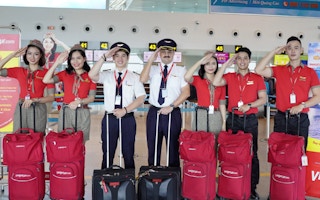A sales promotion for low-cost Vietnamese airline VietJet has been called out for greenwashing.
To continue reading, subscribe to Eco‑Business.
There's something for everyone. We offer a range of subscription plans.
- Access our stories and receive our Insights Weekly newsletter with the free EB Member plan.
- Unlock unlimited access to our content and archive with EB Circle.
- Publish your content with EB Premium.
The budget carrier’s “50% discount special promotion” is appealing to earth-conscious customers to fly with the airline in a bid to help the planet.
The promotion, which is running from February 20 until April 27, offers half-price fares in Vietnam and other destinations in Asia, and promises to give tourists “opportunities to experience new destinations, refresh emotions and enjoy flying green with Vietjet.”
The promo comes a month after the airline announced that it was increasing the frequency of its flights between Vietnam and India, providing direct routes connecting Hanoi, Ho Chi Minh City and Da Nang with New Delhi and Mumbai.
“
Equipped with a modern, fuel-efficient fleet, Vietjet’s eco-friendly flights will bring new and emotional flying experiences to people and visitors at an altitude of 10,000 meters.
Nguyen Thanh Son, vice president, Vietjet
“With the 50% discount special promotion, Vietjet welcomes all passengers to participate in the “Protect our planet – Fly with Vietjet” program, starting a new journey to conquer new destinations whilst inspiring and calling on people around the world to join hands to protect the green future, protecting Mother Earth,” the promo reads.
The promotion contains no link to Vietjet’s “Protect our planet” initiative, nor any further information on why it is an environmentally friendly initiative.
The airline’s chief executive, Nguyen Thanh Son, said in the promotion: “Equipped with a modern, fuel-efficient fleet, Vietjet’s eco-friendly flights will bring new and emotional flying experiences to people and visitors at an altitude of 10,000 meters.”
VietJet uses the Airbus Sharklet A320 and Airbus A321 planes, which it claims are “low-cost, fuel efficient and environmentally-friendly.”
A320 and A321 planes are narrow-body, commercial passenger twin engine jet airliners that carry 185 to 236 passengers.
Walter Edgar Theseira, associate professor at Singapore University of Social Sciences’s urban transportation programme, said that this type of plane is generally more eco-friendly than a full service airline because it carries as many passengers as possible, doesn’t waste space on business class seats, and carries minimal catering.
“The question is whether advertising eco-friendliness as an airline takes business from less environmentally friendly competitors, or whether it just increases demand for air travel—which is negative for the environment,” he said.
Greenwash?
Vietnam-based brand strategist Aneek Ahmed, founder and strategist at The Outwit Company, and former Coca-Cola marketer, told Eco-Business that making environmental claims in the promotion was a mistake.
“It [Vietjet’s promotion] reeks of disingenuity, as there is no information about how and why this promotion is “green”. Not to mention that flying is hardly a “green” thing to do anyway.”
“The company would have been better served designing a separate sustainability programme if it truly wanted to be environmentally conscious and build that into their brand strategy,” he said.
“
It [Vietjet’s promotion] reeks of disingenuity, as there is no information about how and why this promotion is “green”.
Aneek Ahmed, founder and strategist, The Outwit Company
Ahmed added that although these claims should reflect poorly on Vietjet’s brand, he doubted if they would have a negative impact in a market like Vietnam, “where consumers aren’t demanding enough on such [environmental] issues yet.”
“It’s time that businesses in Vietnam understood that a real sustainability agenda can be a brand benefit and help build brand equity in categories with low (or no) loyalty—if it gets built into the core of their plans and is not just an afterthought,” he said.
Eco-Business has reached out to Vietjet for comment.
VietJet, which is led by chairwoman Nguyen Thanh Ha, has had its sustainability credentials questioned before. The airline courted controversy in the past with bikini-clad flight attendants and risqué advertising campaigns that have attracted accusions of sexism and the objectification of women.
The company launched a five-year sustainable growth programme in 2017, which pledged to focus on human resources, CSR and environmental protection, as well as promote local economic development and culture.
Air travel produces around 2 per cent of all human-induced carbon dioxide emissions, and the industry’s high and growing carbon footprint—by 2050, aviation could be responsible for 300-700 per cent more carbon emissions—led last year to the birth of flight shaming, the social phenomenon of making people who fly feel guilty.










